A certain approach to the study of issues of society, and democracy as its most important element, is called the scientific method. It helps to create directions for research activities aimed at establishing objective patterns of development of the main historical types of democratic governance, including in its modern forms. Researchers identify several groups of methods used in political science analysis: general scientific, socio-humanitarian and special. General scientific methods consist of two main components or subgroups of cognitive means: logical and heuristic methods, and philosophical and axiological principles for the study of political life. There are general scientific methods such as induction and deduction, analysis and synthesis, diagnosis and prognosis, definition and classification, comparison and analogy, descriptive and specific description and abstract explanatory interpretation, observation and experiment, strategic analysis and logical-mathematical modelling, etc. These methods are also called general-logical. Socio-humanitarian methods include methods of historical comparative and synchronous comparative research, analysis of documents and sources. Special scientific methods include techniques developed by political science itself as modifying or combining other methods into special tools used in political objects analyzing, for instance, simulating political situations using elements of game theory or rating expert assessments of political leaders with scaling, comparative analysis of states and parties, carried out using computer technology. Methods containing attitudes and criteria for a certain understanding and interpretation of political phenomena are called approaches. For example, a psychological approach that helps to study a social reality based on the subjective vision of this reality by a certain individual placed in certain socio-political conditions, in a psychological environment; an economic approach characterized by the determination of a policy by an economy that is its concentrated expression; a sociological approach, meaning the study of the political system, society, party in terms of the interests of the social groups that constitute it, the social structure of the subject being studied, the social statuses and roles played by the individuals that make this group; regulatory value approach, according to which political phenomena are assessed in terms of compliance with the norms of morality, principles of justice and the common good. There are three groups of methods in the political science encyclopedic dictionary used in the study of political processes, including democratic ones: comparative historical, empirical and systemic. Comparative and historical methods include methods of historical description, specific analysis, comparative, periodization, chronological, prognostic, and provide an opportunity to study political phenomena, both in close connection with the historical situation and in qualitative change at various stages of development, making it possible to identify the genetic relationship, their typological connections, differences, allow to cover the phenomenon of democracy as a whole, but not in any part of it. Empirical approaches to political research are associated with the practical need for objective knowledge of political reality related to the participation of citizens in politics. A significant place in empirical research is given to the issue of political behaviour, the study of political culture, the study of the influence of various factors on the political process, the system analysis of large and small political structures, the comprehensive study of political governance, the structural and political analysis of political institutions, etc. Systemic approaches make it possible to study politics as a complex process, identify the most significant elements on the general background of the development of a political phenomenon, to follow their interdependence and interaction. In order to classify the methods of political science research, their division into qualitative and quantitative is also used. The first ones rely on the study and definition of qualitative features and properties of political objects, the second ones rely on the measurement of various parameters using mathematical formalization. However, in modern studies, it is sometimes quite difficult to define the boundaries between qualitative and quantitative methods.
Latest News
Germany’s Antisemitism Commissioner pushes to outlaw slogan ‘From the river to the sea’
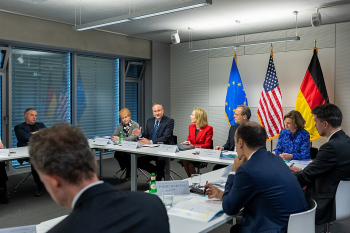 Germany’s Antisemitism Commissioner pushes to outlaw slogan ‘From the river to the sea’
Germany’s Antisemitism Commissioner pushes to outlaw slogan ‘From the river to the sea’
Germany’s top official charged with combating antisemitism is calling for a ban on pro-Palestinian slogans such as “From the river...
Read More... EU reaches deal on Talent Pool to streamline recruitment in shortage sectors
 EU reaches deal on Talent Pool to streamline recruitment in shortage sectors
EU reaches deal on Talent Pool to streamline recruitment in shortage sectors
EU lawmakers have reached a political agreement to launch the EU Talent Pool, a digital platform designed to connect employers in member...
Read More... EBU calls on Poland to back media freedom reforms with adequate funding
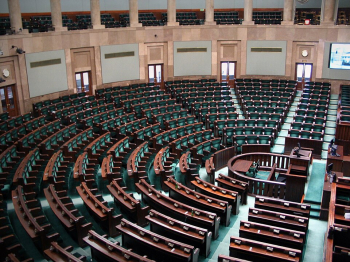 EBU calls on Poland to back media freedom reforms with adequate funding
EBU calls on Poland to back media freedom reforms with adequate funding
The European Broadcasting Union (EBU) has urged the Polish government to pair its media freedom reforms with sufficient financial support...
Read More... EU unveils stronger measures to safeguard democracy and civil society
 EU unveils stronger measures to safeguard democracy and civil society
EU unveils stronger measures to safeguard democracy and civil society
In an era marked by international conflict and rapid technological change, the European Union is stepping up efforts to defend its democratic...
Read More... Gender equality week 2025: Europe focuses on closing the gender talent gap
 Gender equality week 2025: Europe focuses on closing the gender talent gap
Gender equality week 2025: Europe focuses on closing the gender talent gap
The European Parliament is turning the spotlight on women’s talent this November, as committees gather for the sixth edition of European...
Read More... Geneva forum to tackle democracy and climate change solutions
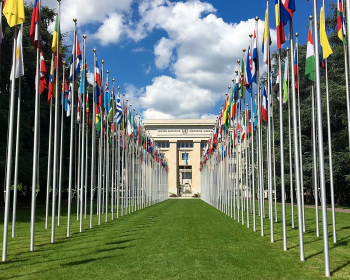 Geneva forum to tackle democracy and climate change solutions
Geneva forum to tackle democracy and climate change solutions
The fifth session of the Forum on Human Rights, Democracy and the Rule of Law will convene on 13–14 October 2025 at the Palais des...
Read More... Trio wins 2025 Nobel Prize in Economics for work on innovation and “creative destruction”
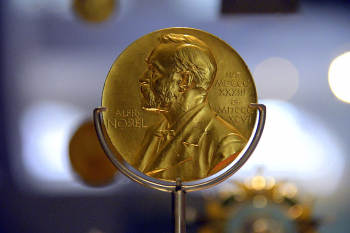 Trio wins 2025 Nobel Prize in Economics for work on innovation and “creative destruction”
Trio wins 2025 Nobel Prize in Economics for work on innovation and “creative destruction”
Joel Mokyr, Philippe Aghion, and Peter Howitt have been awarded the 2025 Nobel Prize in Economics for their groundbreaking research on...
Read More... Greenland’s Premier: “The EU and Greenland need each other”
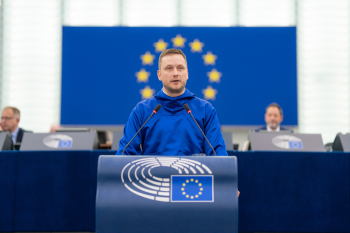 Greenland’s Premier: “The EU and Greenland need each other”
Greenland’s Premier: “The EU and Greenland need each other”
For the first time in history, a Greenlandic leader addressed the European Parliament. Premier Jens-Frederik Nielsen spoke to Members...
Read More... Over 100 rabbis urge EU leaders to protect Jewish communities
 Over 100 rabbis urge EU leaders to protect Jewish communities
Over 100 rabbis urge EU leaders to protect Jewish communities
“Do we still have a future in Europe?”
Read More... Germany signals openness on frozen Russian assets
 Germany signals openness on frozen Russian assets
Germany signals openness on frozen Russian assets
Germany is showing a willingness to discuss new ideas on how to deal with Russian assets frozen in the European Union, Finance Minister...
Read More... Must Read
-
 Zurab Musinyan: “Let my case lie at door of Russian special services combating international terrorism…”
Specialized Oil-Loading Seaport Vitino captured by Russian security officials through hostage taking keeps on being a subject of carve-up and litigations by Russian and international companies....Read More...
Zurab Musinyan: “Let my case lie at door of Russian special services combating international terrorism…”
Specialized Oil-Loading Seaport Vitino captured by Russian security officials through hostage taking keeps on being a subject of carve-up and litigations by Russian and international companies....Read More... -
 Young Europeans losing faith in democracy
Recent findings from a comprehensive survey conducted by the YouGov institute for the Tui Foundation reveal a concerning trend among Europe’s youth: a growingRead More...
Young Europeans losing faith in democracy
Recent findings from a comprehensive survey conducted by the YouGov institute for the Tui Foundation reveal a concerning trend among Europe’s youth: a growingRead More... -
 World Refugee Day: Joint Statement by the European Commission and the High Representative
No country, no region in the world has been spared from the impact of COVID-19. The virus is exacerbating existing inequalities and has a disproportionate effect on refugees,Read More...
World Refugee Day: Joint Statement by the European Commission and the High Representative
No country, no region in the world has been spared from the impact of COVID-19. The virus is exacerbating existing inequalities and has a disproportionate effect on refugees,Read More... -
 Why Andorra finds EU membership unappealing?
Andorra, a small landlocked country located in the eastern Pyrenees mountains between France and Spain, has long maintained a unique position in Europe. With a population ofRead More...
Why Andorra finds EU membership unappealing?
Andorra, a small landlocked country located in the eastern Pyrenees mountains between France and Spain, has long maintained a unique position in Europe. With a population ofRead More... -
 Who will succeed Stoltenberg as NATO secretary-general?
As Jens Stoltenberg's tenure as NATO Secretary-General approaches its end, discussions and conjecture are mounting regarding his potential successor.Read More...
Who will succeed Stoltenberg as NATO secretary-general?
As Jens Stoltenberg's tenure as NATO Secretary-General approaches its end, discussions and conjecture are mounting regarding his potential successor.Read More... -
 Which EU candidate country is the most likely to join the bloc quickly?
The European Union (EU) has a well-established process for countries seeking membership, known as accession. While the journey to EU membership can be long and arduous,Read More...
Which EU candidate country is the most likely to join the bloc quickly?
The European Union (EU) has a well-established process for countries seeking membership, known as accession. While the journey to EU membership can be long and arduous,Read More... -
 Where are the women in Fiji's new era of democracy?
Fiji's recent election in December 2022 marked a milestone in the country's democratic journey, with a coalition government led by Sitiveni Rabuka, a former prime minister, coupRead More...
Where are the women in Fiji's new era of democracy?
Fiji's recent election in December 2022 marked a milestone in the country's democratic journey, with a coalition government led by Sitiveni Rabuka, a former prime minister, coupRead More...
Latest News
Germany’s Antisemitism Commissioner pushes to outlaw slogan ‘From the river to the sea’
 Germany’s Antisemitism Commissioner pushes to outlaw slogan ‘From the river to the sea’
Germany’s Antisemitism Commissioner pushes to outlaw slogan ‘From the river to the sea’
Germany’s top official charged with combating antisemitism is calling for a ban on pro-Palestinian slogans such as “From the river...
Read More... EU reaches deal on Talent Pool to streamline recruitment in shortage sectors
 EU reaches deal on Talent Pool to streamline recruitment in shortage sectors
EU reaches deal on Talent Pool to streamline recruitment in shortage sectors
EU lawmakers have reached a political agreement to launch the EU Talent Pool, a digital platform designed to connect employers in member...
Read More... EBU calls on Poland to back media freedom reforms with adequate funding
 EBU calls on Poland to back media freedom reforms with adequate funding
EBU calls on Poland to back media freedom reforms with adequate funding
The European Broadcasting Union (EBU) has urged the Polish government to pair its media freedom reforms with sufficient financial support...
Read More... EU unveils stronger measures to safeguard democracy and civil society
 EU unveils stronger measures to safeguard democracy and civil society
EU unveils stronger measures to safeguard democracy and civil society
In an era marked by international conflict and rapid technological change, the European Union is stepping up efforts to defend its democratic...
Read More... Gender equality week 2025: Europe focuses on closing the gender talent gap
 Gender equality week 2025: Europe focuses on closing the gender talent gap
Gender equality week 2025: Europe focuses on closing the gender talent gap
The European Parliament is turning the spotlight on women’s talent this November, as committees gather for the sixth edition of European...
Read More... Geneva forum to tackle democracy and climate change solutions
 Geneva forum to tackle democracy and climate change solutions
Geneva forum to tackle democracy and climate change solutions
The fifth session of the Forum on Human Rights, Democracy and the Rule of Law will convene on 13–14 October 2025 at the Palais des...
Read More... Trio wins 2025 Nobel Prize in Economics for work on innovation and “creative destruction”
 Trio wins 2025 Nobel Prize in Economics for work on innovation and “creative destruction”
Trio wins 2025 Nobel Prize in Economics for work on innovation and “creative destruction”
Joel Mokyr, Philippe Aghion, and Peter Howitt have been awarded the 2025 Nobel Prize in Economics for their groundbreaking research on...
Read More... Greenland’s Premier: “The EU and Greenland need each other”
 Greenland’s Premier: “The EU and Greenland need each other”
Greenland’s Premier: “The EU and Greenland need each other”
For the first time in history, a Greenlandic leader addressed the European Parliament. Premier Jens-Frederik Nielsen spoke to Members...
Read More... Over 100 rabbis urge EU leaders to protect Jewish communities
 Over 100 rabbis urge EU leaders to protect Jewish communities
Over 100 rabbis urge EU leaders to protect Jewish communities
“Do we still have a future in Europe?”
Read More... Germany signals openness on frozen Russian assets
 Germany signals openness on frozen Russian assets
Germany signals openness on frozen Russian assets
Germany is showing a willingness to discuss new ideas on how to deal with Russian assets frozen in the European Union, Finance Minister...
Read More... Must Read
-
 Zurab Musinyan: “Let my case lie at door of Russian special services combating international terrorism…”
Specialized Oil-Loading Seaport Vitino captured by Russian security officials through hostage taking keeps on being a subject of carve-up and litigations by Russian and international companies....Read More...
Zurab Musinyan: “Let my case lie at door of Russian special services combating international terrorism…”
Specialized Oil-Loading Seaport Vitino captured by Russian security officials through hostage taking keeps on being a subject of carve-up and litigations by Russian and international companies....Read More... -
 Young Europeans losing faith in democracy
Recent findings from a comprehensive survey conducted by the YouGov institute for the Tui Foundation reveal a concerning trend among Europe’s youth: a growingRead More...
Young Europeans losing faith in democracy
Recent findings from a comprehensive survey conducted by the YouGov institute for the Tui Foundation reveal a concerning trend among Europe’s youth: a growingRead More... -
 World Refugee Day: Joint Statement by the European Commission and the High Representative
No country, no region in the world has been spared from the impact of COVID-19. The virus is exacerbating existing inequalities and has a disproportionate effect on refugees,Read More...
World Refugee Day: Joint Statement by the European Commission and the High Representative
No country, no region in the world has been spared from the impact of COVID-19. The virus is exacerbating existing inequalities and has a disproportionate effect on refugees,Read More... -
 Why Andorra finds EU membership unappealing?
Andorra, a small landlocked country located in the eastern Pyrenees mountains between France and Spain, has long maintained a unique position in Europe. With a population ofRead More...
Why Andorra finds EU membership unappealing?
Andorra, a small landlocked country located in the eastern Pyrenees mountains between France and Spain, has long maintained a unique position in Europe. With a population ofRead More... -
 Who will succeed Stoltenberg as NATO secretary-general?
As Jens Stoltenberg's tenure as NATO Secretary-General approaches its end, discussions and conjecture are mounting regarding his potential successor.Read More...
Who will succeed Stoltenberg as NATO secretary-general?
As Jens Stoltenberg's tenure as NATO Secretary-General approaches its end, discussions and conjecture are mounting regarding his potential successor.Read More... -
 Which EU candidate country is the most likely to join the bloc quickly?
The European Union (EU) has a well-established process for countries seeking membership, known as accession. While the journey to EU membership can be long and arduous,Read More...
Which EU candidate country is the most likely to join the bloc quickly?
The European Union (EU) has a well-established process for countries seeking membership, known as accession. While the journey to EU membership can be long and arduous,Read More... -
 Where are the women in Fiji's new era of democracy?
Fiji's recent election in December 2022 marked a milestone in the country's democratic journey, with a coalition government led by Sitiveni Rabuka, a former prime minister, coupRead More...
Where are the women in Fiji's new era of democracy?
Fiji's recent election in December 2022 marked a milestone in the country's democratic journey, with a coalition government led by Sitiveni Rabuka, a former prime minister, coupRead More...
Methods for European democracy studying

